Senator Natasha Akpoti-Uduaghan, representing Kogi Central Senatorial District, affirmed her commitment to visiting her constituency for the Sallah break, dismissing circulating rumors of a cancellation. Her media team released a statement emphasizing her unwavering dedication to her constituents and the importance of celebrating Eid-el-Fitr together. The statement underscored the senator’s commitment to community engagement and fostering unity, reassuring the public that all necessary arrangements for a successful and joyous event were in place. This announcement, however, came on the heels of a government ban on rallies and public gatherings due to security concerns, raising questions about the feasibility and potential implications of the senator’s planned visit.
The Kogi State Government, citing intelligence reports, had imposed restrictions on rallies and other public gatherings, expressing concerns about potential violence disguised as political or religious agitation, particularly in the Kogi Central region. This precautionary measure followed incidents in other parts of the state, including Kogi West, where fishing and related activities were also banned due to reported loss of life. The government’s statement, issued by Information Commissioner Kingsley Fanwo, emphasized the importance of maintaining stability and preventing security breaches, creating a complex backdrop for Senator Akpoti-Uduaghan’s planned Sallah visit.
The senator’s insistence on proceeding with her visit despite the government’s security concerns underscores her commitment to her constituents and her belief in the importance of direct engagement. Her decision presents a potential clash between her role as a representative of the people and the government’s responsibility to maintain order and prevent potential unrest. This situation highlights the delicate balance between individual rights and public safety, particularly in a politically charged environment.
The conflicting messages from the senator and the state government create uncertainty and raise several key questions. Will the senator’s visit proceed as planned despite the ban on public gatherings? How will the government respond to her defiance of the security measures? Will the senator’s presence exacerbate the potential for unrest, or will it serve as a unifying force within the community? These questions highlight the potential for escalating tensions and underscore the need for clear communication and cooperation between the senator, the government, and the community.
The situation also raises broader questions about the role of political leaders in navigating security concerns and balancing their responsibilities to their constituents with the need to maintain public order. Senator Akpoti-Uduaghan’s decision to proceed with her visit, despite the risks, reflects a commitment to direct engagement and a belief in the importance of her presence in the community. However, it also raises questions about the potential consequences of challenging government directives in a sensitive security context.
The outcome of this situation will likely have significant implications for the relationship between the senator and the state government, as well as for the overall political climate in Kogi Central. Whether the senator’s visit proceeds smoothly or leads to further tensions remains to be seen. Regardless of the outcome, the events surrounding the Sallah break will undoubtedly shape the political landscape in the region and serve as a test of the delicate balance between individual rights, public safety, and political leadership. The situation underscores the need for open communication and collaborative efforts to address security concerns while respecting the rights of citizens and their elected representatives.


